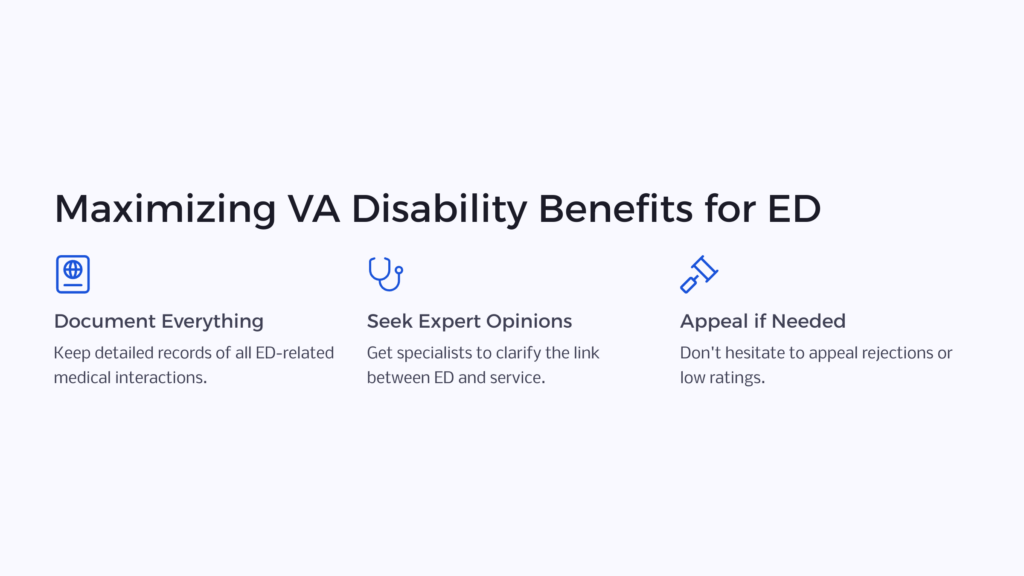Erectile Dysfunction is the inability to achieve or maintain an erection for successful sexual intercourse. It is also common among military veterans, in whom mental illnesses such as post-traumatic stress disorder, depression, and anxiety that arise in response to their service can contribute to the PTSD/SUD-cycle.
Although the VA rates erectile dysfunction at 0%, you can still receive monthly compensation for it if the condition is a secondary service-connected condition and you are rated within certain percentages.
Healthswisdom explains how to get rated for VA erectile dysfunction in this article.
And your military experience, I’m sure, was unforgettable. But the years of being in the military may have left you with physical or mental health problems. Erectile Dysfunction: One of the conditions that a lot of male veterans have is erectile dysfunction.
The phenomenon in which a male is unable to maintain an erection while performing sexual intercourse is known as erectile dysfunction. The consequences of impotence are so disastrous since sex is an important part of a rewarding and satisfying life. Sexual dysfunction can lead to decreased self-worth and diminished quality of relationships.
The VA has no rating for Erectile Dysfunction on its own as a condition, but it does have ratings for factors associated with the condition based on other listings associated with the genitals. For instance, you probably are entitled to a VA disability rating if you had an accident that deformed or injured your penis.
Furthermore, ED may be associated with another service-connected disabling condition, such as diabetes or post-traumatic stress disorder. As a result, you could potentially file the disorder as a secondary condition.
Veterans and Erectile Dysfunction
Causes Erectile dysfunction is most commonly caused by certain physical or psychological factors, such as trauma to the penis for example, a deep perineal or pelvic fracture However, it can be the result of multiple underlying physical changes including alcohol use, diabetes and other neurodegenerative disorders.
Some of the factors that can increase your risk of developing erectile dysfunction include obesity, smoking, penis injury, and alcohol intake. And medical conditions such as heart disease and diabetes can also lead to erectile dysfunction, as can psychological issues such as anxiety and depression.
Consequently, the causes of erectile dysfunction are likely to be. In general, the causes of erectile dysfunction from known to include the following:
- High cholesterol
- Parkinson’s disease
- Obesity
- Certain sleep disorders
- Procedures that affect the penis or tissues near it
- Low testosterone
- High blood pressure
- Multiple sclerosis
If there are issues during sex, such as obtaining or sustaining an erection, then men should talk to a doctor, she said. You might have a sex problem.
How Does the VA Rate Erectile Dysfunction?
The VA rates erectile dysfunction under its schedule for rating genitourinary system conditions. Erectile dysfunction is evaluated at 0 percent, whether there is deformity of the penis or not.
In order to satisfy the VA’s criteria for erectile dysfunction, you must prove you have a medical diagnosis. You’ll also have to establish a connection between your military service and erectile dysfunction. For example, if you were injured in the pelvic region while serving in the military, or if you experienced mental trauma resulting from a particular event, you may be eligible for disability benefits.
You may also demonstrate that another service-connected disability is aggravating the erectile dysfunction for which you already have a rating, like post-traumatic stress disorder or prostate cancer. Showing it is causing relationship distress or whatever in the relationship and other parts of your life.
Though the 0 percent rating will not offer you compensation in general, it may qualify you to seek compensation through one or two other paths.
You could also demonstrate that another service-connected disability makes the erectile dysfunction you already have a rating for worse, like post-traumatic stress disorder or prostate cancer. It can be helpful to show that your erectile dysfunction is harming your relationships or other parts of your life.
Although the 0 percent rating also typically does not result in any payment directly, it might allow you to receive payment through a couple of other methods.
Other Genitourinary Ratings That May Apply
If you have had surgery or suffered serious trauma to the pelvic region, it may be possible to qualify for a rating of disability under other codes concerning the penis or erectile dysfunction.
The conditions of the penis which can cause a disability rating are:
- Code 7520 applies when half the penis is eliminated or more. He will have a 30 percent disability.
- If a doctor removes the glans of the penis Code 7521 is used. Those who meet the requirements receive a 20 percent disability rating.
- Code 7523 is for total atrophy of the testes. A condition of this kind must affect both testicles to receive a 20% disability rating; If one testis is involved or affected, then he will get 0% disability.
- Code 7524 is used when a physician takes out the testes. When both are removed, the condition rates 30 percent, and the removal of only one results in 0 percent.
When one testis is removed for a service-connected injury and the veteran does not have the other testis, or when the veteran’s other testis is nonfunctional due to reasons other than service (other than age, the veteran is entitled to a 30 percent disability rating, under code 7524.
Special Monthly Compensation for Erectile Dysfunction
Veterans who qualify for a 0 percent disability evaluation here are entitled to disability compensation if they are eligible under compensation and pension law for other benefits, such as Special Monthly Compensation (SMC) Category K (SMC-K), based on loss of use of a creative organ. SMC-K is for those who suffered the “loss of a creative organ|” — an extra monthly benefit for veterans who lost functionality of a key part of the body, such as a hand or eye.
If your ED is so total that you can’t achieve intercourse at all, or you have a penile deformity, you might be rated for SMC-K. To qualify for compensation according to the VA, you’ll need to have medical records linking your erectile dysfunction to your service time and show that it affects your life negatively.
It’s essential to realize that even if you are on medication for your erectile dysfunction, like Viagra or something else, you can still enjoy SMC-K.
The existing monthly rate of SMC-K is $128.62 for 2023.
TDIU and Erectile Dysfunction
Because the VA rating for erectile dysfunction is 0 percent, it is unlikely that your erectile dysfunction alone would qualify you for Total Disability Individual Unemployability, or TDIU.
A veteran must meet one of the following to be eligible for TDIU:
Active Duty Type 5: at least one service-connected disability with a rating of at least 60 percent
Two or more service-connected disabilities, at least one rated 40 percent or more disabled, and a combined rating of 70 percent or more.
Not only do you need to meet the VA’s rating criteria, but you also need to prove you can’t work in a job that pays you to do that specific job. For example, if you are on medication with pretty drastic side effects and it causes you to be unable to work, you might receive TDIU.
E.D. [Erectile Dysfunction] As Secondary Impairment
Various diseases can cause or exacerbate erectile dysfunction:
- PTSD, anxiety, or depressive disorders
- Hypertension
- Parkinson’s disease
- Peyronie’s disease
- Sleep apnea
- Low testosterone
- Diabetes
- Multiple sclerosis
Drugs you take for a condition, such as depression or high blood pressure, can make erectile dysfunction worse.
To be able to substantiate erectile dysfunction as a secondary condition, you need to submit a copy of your medical history indicating a essay proof of your primary service-connected condition. The treating doctor needs to report that the primary disability is causing the ED.
If your ED is a secondary condition and is found to be an underlying cause of your other SC disability, then you can get a 0% disability rating and be eligible for added compensation under SMC-K.
How to Get VA Disability for ED
If you want to get a VA rating for erectile dysfunction, you must also request a Compensation and Pension (C and P) exam from your local VA office. Based on your exam, the VA examiner will fill out the Disability Benefits Questionnaire for Male Reproductive Organ Conditions and provide it to the VA, which will review it and assign you a rating.
Provided someone has no visible penile malformations, no PC should be necessary. Rather, the questionnaire would be completed by the VA treating physician who would rely upon the physician’s own medical records (where it is confirmed that the veteran has a diagnosis of erectile dysfunction and supporting documentation that it is related to their period in service).
A nexus letter from a treating doctor that links the veteran’s military service to their erectile dysfunction can aid in establishing this nexus. For example, if the veteran is being treated for service-related PTSD, which has to do with maintaining an erection, a contractor physician’s nexus letter will further the VA in his rating decision.
In the end, a VA rating for erectile dysfunction is feasible if the veteran has the evidence to support their claim and shows a nexus between their time in service and the disability.
Do you have anymore additional questions on how to get a VA disability rating for erectile dysfunction? Call the NYT Veterans Help Line or reach out to the Veterans Guide for further guidance.



